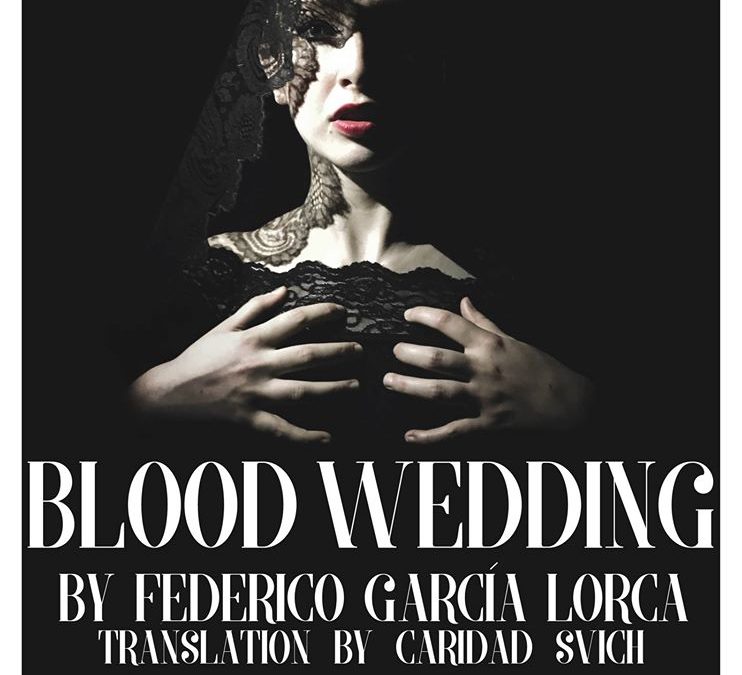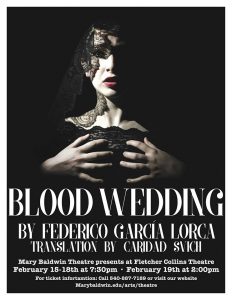By Maddie Buttitta
The play’s title alone suggests an abstract, yet raw atmosphere, in which movement within and away places and people are apparent and abundant. Forbidden love, threadbare family ties, and traditions create the space in between which the characters have the choice to grow, move, or dissolve. In this interview spotlighting Mary Baldwin Theatre’s upcoming production of “Blood Wedding”, I spoke via email with Shakespeare & Performance assistant professor and director extraordinaire Doreen Bechtol about bringing Federico García Lorca’s evocative play to life.
Q: What attracted you to “Blood Wedding”?
DB: Years ago, I started work on this play with Jaq Bessell, a former professor from the Shakespeare & Performance program. She and I adored the Carlos Saura film (a flamenco style adaptation of Blood Wedding), and were excited to use the film as inspiration for our production. Unfortunately, we only rehearsed a few scenes before a key actor moved across the country and we therefore put the project on hold. Fast forward ten years later to last fall when playwright, Caridad Svich, visited Mary Baldwin to discuss her work, which also includes translating Federico Garcia Lorca’s work. Caridad’s visit, along with conversations between Dr. Janna Segal and Molly Seremet about Blood Wedding, indicated to me that it was the right time to propose this play to the undergrad department. On a personal note, I love the epic nature of the story. Like the Greek theatre upon which it was based, this play features communal rituals that examine individual desire set against long held cultural traditions; the poetic beauty of love and death, and a wonderful departure into a surrealist world at the end of the play.
Q: What were/are the challenges that came with directing a play translated from its original language? What contact did you have with the translator (if at all)?
DB: This is a fascinating translation by Caridad Svich in that the translation seems to be quite literal, rather than a more lyrical or poetic translation, such as Ted Hughes. As such, the starkness of the language seems a bit more earthy and awkward. To me there is rawness to this translation, perhaps more of a visceral quality that presents an interesting challenge. At the same time, we’ve discussed in rehearsal how the text is almost like a blank canvas in that it is not telling you to do something specific; it is open to interpretation. Every time we approach a scene we seem to peel back more layers and then we hope we can figure a way convey the multiplicity of options.
Q: What impact does authorial intent have (if any) in service to your production?
DB: (Federico García) Lorca wrote this play approximately three years before he was executed by fascist forces prior to the start of the Spanish Civil war. He denounced fascism; he espoused freedom of conscience and intellect; he was a homosexual, meaning that he publicly stood apart from the values set forth by the Nationalist front. This play represents those individuals who stand apart from their community and pursue their own desires, and pay the price for choosing individual liberty, rather than maintain the culturally acceptable lifestyle upheld by their rural community. We tried to focus on the forbidden desire and it’s destructive conclusion. We hope that the audience feels conflicted about where and with whom to place their sympathy, since everyone is to blame for the outcome.
Q: What particular challenges did you face in bringing “Blood Wedding” to life?
DB: I gave myself a fairly big challenge as a director, which is that I decided I would also perform the part of the Mother. I thought it important to show the age range between the older and younger generation, so I also cast my friend and collaborator, Thadd McQuade, as the Father of the Bride. Luckily, between Thadd, Molly Seremet, and me, we’ve struck upon a wonderful directorial collaboration. Not to mention that second-year (MLitt) student Nick Ciavarra, as our assistant director, has been an exceptional help. Yet, this is just the tip of the iceberg: our stage management team, led by Libby Powell, have kept the process running smoothly, especially given that we’re mainly working with student designers learning the process (some for the first time). In addition, our amazingly talented casts of undergrad and graduate students are extraordinarily generous performers; (they) possess such discipline and genuine care for one another. I feel honored to work with such fine people. Finally, our feisty village of theatre-makers has enjoyed the support of Terry Southerington and Sam Koogler, who both provide the tireless backbone of the undergraduate program. The only other challenge that we faced during the process is the perpetual challenge in the theatre: there’s never enough time to do everything that you want to do; never.



